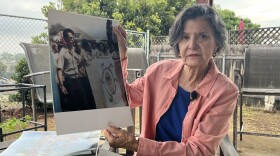The U.S. Supreme Court said Wednesday that the federal government cannot, before trial, seize the assets of the accused if those assets are unrelated to the crime and are needed to pay a defense attorney.
The court's ruling came in the case of a Miami woman named Sila Luis, who was accused of Medicare and banking fraud. Prosecutors charged that she used kickbacks and other schemes to fraudulently obtain $45 million.
She had $2 million left when prosecutors, believing they would eventually need the money for restitution, got a court order seizing all of her assets — those related to the crime and those unrelated.
Luis challenged the asset-seizure order on grounds that she needed the untainted assets — those assets the government conceded were unrelated to the crime — to hire a lawyer for her trial.
A Supreme Court majority agreed that allowing the government to take her untainted assets would violate her Sixth Amendment right to counsel of her choice.
Writing for four of the justices, Justice Stephen Breyer said that the untainted property "belongs to the defendant, pure and simple." He added that, as a practical matter, to accept the government's position could have grave consequences for a defendant who is actually innocent, whose assets are all untainted and, if seized, would leave the defendant without her lawyer of choice to defend against meritless charges.
"To permit the Government to freeze Luis' untainted assets" in this case, Breyer wrote, "would unleash a principle of constitutional law that would have no obvious stopping place."
Joining Breyer's opinion were Chief Justice John Roberts and Justices Ruth Bader Ginsburg and Sonia Sotomayor. Justice Clarence Thomas wrote separately, with a slightly different analysis: The right to counsel, he said, is borne out by both the history and text of the Sixth Amendment. It "implies the right to use lawfully owned property to pay for an attorney. Otherwise the right to counsel — originally understood to protect only the right to hire counsel of choice — would be meaningless."
Justices Anthony Kennedy and Samuel Alito dissented. They said that since assets are fungible, there is no good way for the government to recover ill-gotten gains without a pretrial freeze of all assets, both tainted and untainted. Justice Elena Kagan dissented separately.
Copyright 2016 NPR. To see more, visit http://www.npr.org/.


!["[Untainted property] belongs to the defendant," and the government's seizure of such assets violates the Sixth Amendment, the court said in its ruling.](https://cdn.kpbs.org/dims4/default/552d62a/2147483647/strip/true/crop/2739x1687+130+0/resize/880x542!/quality/90/?url=http%3A%2F%2Fkpbs-brightspot.s3.us-west-2.amazonaws.com%2Fassets%2Fimg%2F2016%2F03%2F30%2Fscotus_wide-417fe36933256a3a1f395e4dcaf07715fd196e66.jpg)



